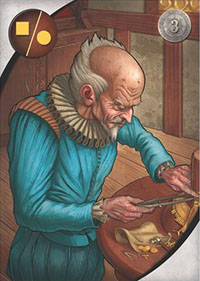-

Development Lines
In Shakespeare, there are 3 great development lines which are the rehearsal tracks, the set dressing, and the costumes. In addition, there are a few alternative sources of points which are non-negligible (the objectives, the gold, and the initial bid).
The game is designed to allow the use of various successful strategies. We could, for example, do a bit of everything well, or push two of the lines as much as possible and deal only lightly with the third one. However, it's a bad idea to focus on exclusively one of the lines.
-
Interaction
Interaction is one of the game's key elements. Which is why players should watch the other players in order to understand their needs so they can be blocked (for example, by claiming the set dressing element they need for their symmetry) and especially to avoid being blocked themselves.
Moreover, you need to watch the other players to create opportunities. For example, if 3 players are fighting for set dressing elements, going for costumes is an excellent idea (and vice versa).
-
Wager
A day's phase 1 (Wager) is a critical moment of the game. It's only natural to pay attention to see what your opponents will probably wager and decide what you yourself really need before choosing.
It's often counter-productive to wager only one cylinder. However, it can sometimes be wise on the last day, when a player has a vital need (in addition to the prestige point) and very little else to do, especially if they're placed late on the Initiative Track.
-
Recruitment
Recruitment is, of course, one of the game's key aspects. Once again, Shakespeare gives players a wide margin for movement. It's thus possible to triumph via an economic strategy, or by recruiting high-priced actors and craftsmen.
During playtests, we've also seen games won with recruitments worth around 11 and 23 Pounds. Not paying a character at the end of the game is a rather stiff but spending the end of the game by collecting money is sometimes less productive than a beautiful costume, or completing a set which will earn direct and objective points.
-
Craftsmen

Level 8 craftsmen (or any craftsman with a "+3" token) give a lot of latitude to the player who owns them if they're used properly, without rushing too much.
For example, building up a set very quickly is possible but unwise, as once finished, the player will no longer hinder their opponents in claiming set dressing elements and will lack time to focus on another aspect of the game.
Also, it's not necessary to finish the costumes quickly (unless dress rehearsal is coming). It's often more useful to spread out the elements taken via the costume mistress over many actors to give yourself the possibility of creating very prestigious costumes or otherwise earn money as needed.
-
Good Score
Players often ask at the beginning of the game what a good score is in Shakespeare. This actually depends on the number of players around the table. So, with 4 players, a tight victory will generally be around 22 points.
With 3 players, around 24 points, With 2 players, around 26 points, and over 30 in solo mode.
-
Acting Own Plays
It's a little known fact, but Shakespeare , in addition to being an exceptional playwright , acted in his own plays (and sometimes even in other writers ).
For this reason, the author has two white quills when he is activated . They represent both his acting prowess and well as the play's direction.
-
Acting Women

In Shakespeare's time, women didn't have the right to practice the occupation of actor. As a consequence , the roles of women were played by young men (whose voice had yet to change) dressed as women. For the artwork of the game, we've decided to allow ourselves a slight anachronism, as it would've been cruel to represent Juliette or Viola with masculine traits.
-
Money By Players
The money amassed by the players (other than that received from the Queen) represents the money gained by having people come see the play. Initially, this money (as well as the Prestige points ) was to be collected at the end of the game.
However, the game's playtests have revealed that it was much more practical for players to take money and points over the course of the game to avoid an overly long final tally, and make it easier to see their level of debt in real time.
-
Costume Money/points
The complete costumes are worth money and/ or points, and sometimes neither. Once again, this represents the public' s reaction .
Meaning that a costume make of common fabric will not get crowds to come and will be worth nothing . A costume made up of fair fabric will attract the public and will thus be profitable.
However, a "precious" costume will impress the crowds, and will be worth much prestige, but no money due to its cost.
-
Rehearsals
The life of a play is divided into many rehearsals . In French, we have the italienne (rehearsal of the text), the allemande ( rehearsal of the movements), the couturiere (dress rehearsal), and the generale (final rehearsal before the show).
Of course, in Shakespeare's day, the occupation of professional actor was still in its infancy, and these traditions were not as deeply established. But it was still interesting to integrate the two dress rehearsals to the game and turn them into a specific moment of the game . Dont acte!
Continue Reading

